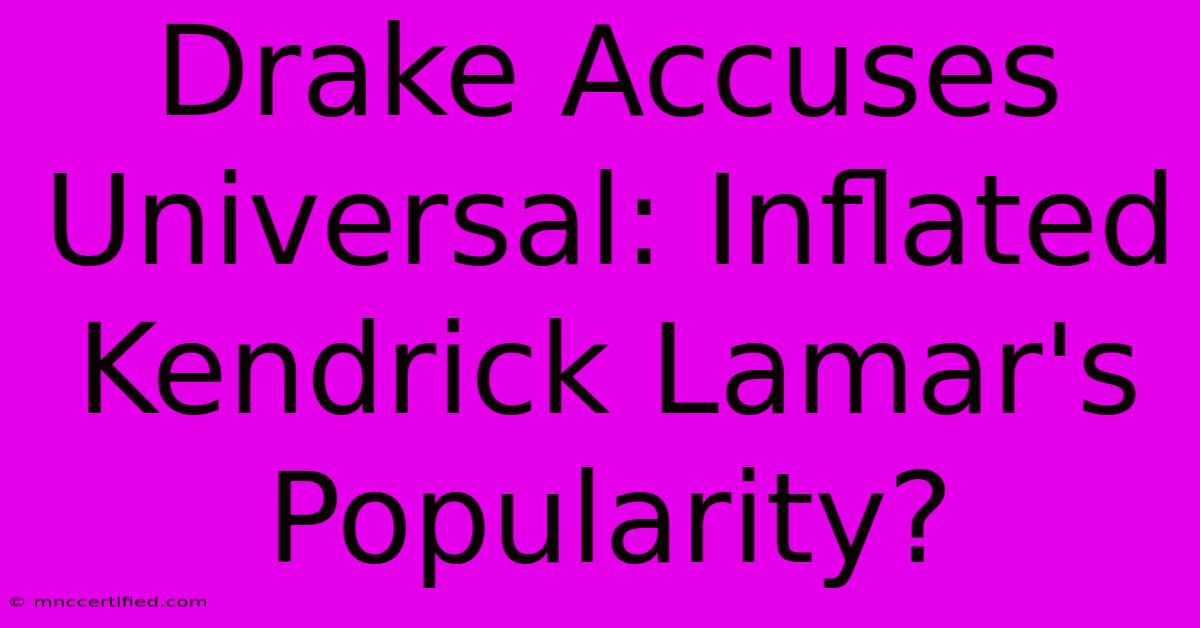Drake Accuses Universal: Inflated Kendrick Lamar's Popularity?

Table of Contents
Drake Accuses Universal: Inflated Kendrick Lamar's Popularity? A Deep Dive into the Streaming Wars
The music industry is a complex ecosystem, and behind the chart-topping hits and sold-out stadiums lies a cutthroat battle for dominance. Recent accusations by Drake against Universal Music Group (UMG) have ignited a firestorm, alleging manipulation of streaming numbers to artificially inflate Kendrick Lamar's popularity. This article delves into the controversy, exploring the accusations, their implications, and the wider context of the streaming wars.
The Accusations: Drake vs. Universal
Drake, a titan in the rap game and a major artist under UMG's Republic Records, publicly voiced his concerns regarding alleged manipulation of streaming data. His accusations, though not explicitly naming Kendrick Lamar, strongly suggested that UMG artificially boosted Lamar's streaming numbers to overshadow Drake's own releases. While Drake hasn't offered concrete evidence, the implication points to a potential power play within the label itself. This isn't simply a feud between artists; it exposes a darker side of the music industry's relationship with streaming platforms and data manipulation.
The Heart of the Matter: Data Integrity
The core issue revolves around the integrity of streaming data. Millions rely on these numbers – charts, awards, and ultimately, an artist's financial success – are all determined by these metrics. If a major label like UMG is manipulating these numbers, it undermines the entire system. This casts doubt not just on Kendrick Lamar's success, but on the validity of chart positions across the board. It raises crucial questions about fairness, transparency, and the very foundation of how we measure musical success in the streaming era.
Beyond the Drake-Lamar Speculation: Wider Implications
While the specific accusations against Universal and their handling of Kendrick Lamar's music are controversial and require further investigation, the incident underscores larger issues within the music industry:
- The Power of Major Labels: Major labels wield significant power over artists' careers, including promotional strategies and data reporting. Drake's accusations highlight potential conflicts of interest within these powerful organizations.
- The Role of Streaming Platforms: While streaming platforms have their own mechanisms for detecting fraudulent activity, they are also reliant on the data provided by labels. The lack of complete transparency in this data sharing presents a significant vulnerability.
- The Future of Charting: The incident calls for increased scrutiny of streaming data and a reevaluation of charting methodologies. Are current systems robust enough to prevent and detect manipulation?
The Ongoing Debate: Transparency and Accountability
Drake's accusations, regardless of their ultimate veracity, have ignited a crucial conversation about transparency and accountability within the music industry. The lack of independent verification of streaming data is a significant concern, and many artists advocate for greater transparency from both labels and streaming platforms. This requires a collaborative effort involving labels, artists, streaming services, and regulatory bodies to ensure fairness and prevent future manipulation.
What needs to change?
This controversy highlights the desperate need for:
- Independent Audits: Regular independent audits of streaming data could offer a crucial layer of verification and deter manipulation.
- Enhanced Transparency: Greater transparency in data reporting from labels to streaming platforms is essential.
- Robust Anti-Fraud Mechanisms: Streaming platforms need more robust mechanisms to identify and address fraudulent activity.
The Drake-Universal controversy, whether centered around Kendrick Lamar or not, serves as a wake-up call. It forces a much-needed discussion about fairness, transparency, and the future of the music industry in the age of streaming. Only through greater accountability and transparency can we ensure that success in the music industry is truly earned, not manufactured.

Thank you for visiting our website wich cover about Drake Accuses Universal: Inflated Kendrick Lamar's Popularity?. We hope the information provided has been useful to you. Feel free to contact us if you have any questions or need further assistance. See you next time and dont miss to bookmark.
Featured Posts
-
Real Estate Investment In Ghana
Nov 26, 2024
-
Maui Invitational U Conns Hurley Wins Early
Nov 26, 2024
-
Roy Keane Fan Confrontation Video
Nov 26, 2024
-
Cancer All Clear For Lauren Laverne
Nov 26, 2024
-
Portugal Real Estate Investment
Nov 26, 2024